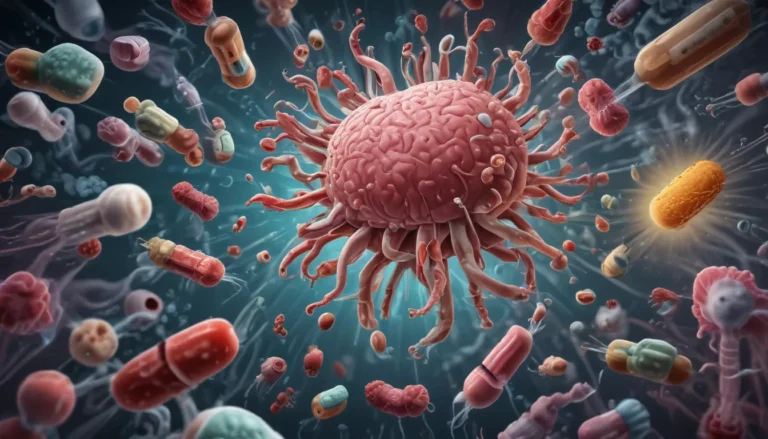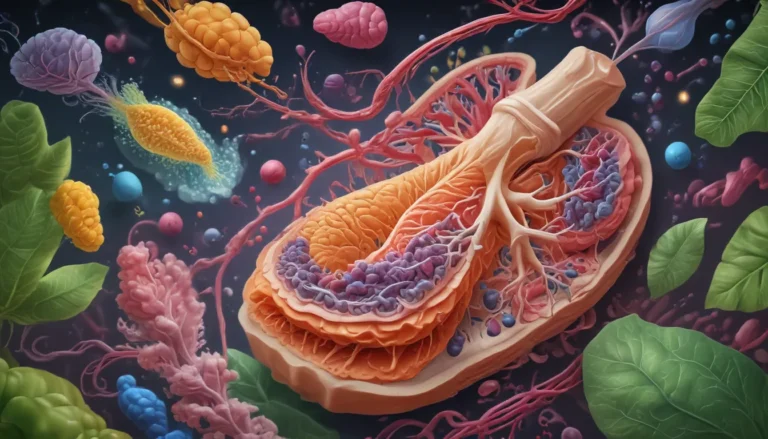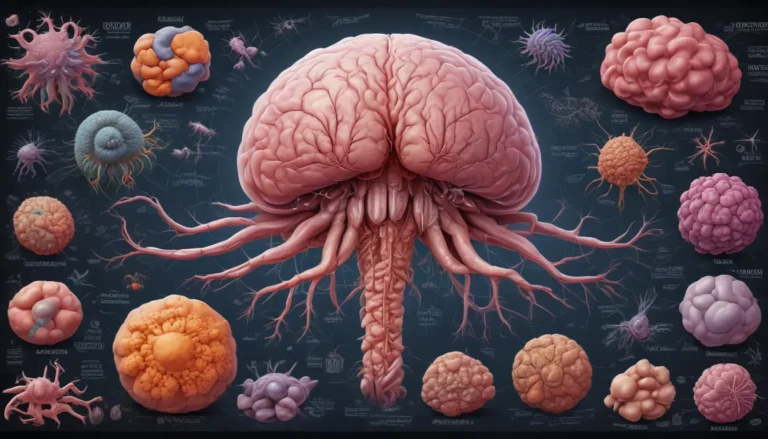A Note About Images: The images used in our articles are for illustration purposes only and may not exactly match the content. They are meant to engage readers, but the text should be relied upon for accurate information.
Hormones are the silent conductors orchestrating a symphony of bodily processes, from growth and metabolism to reproduction and mental health. When the delicate balance of these molecular messengers is disrupted, it can lead to hormone disorders, impacting health and well-being. In this comprehensive guide, we will delve into 19 extraordinary facts about hormone disorders to shed light on their complexity and emphasize the importance of understanding and managing them effectively. So, sit back, relax, and let’s unravel the intriguing world of hormone imbalances.
The Impact of Hormone Disorders
Hormone disorders, also known as endocrine disorders, arise when there is a disruption in hormone production, secretion, or action within the body. These conditions can have a profound impact on an individual’s health and well-being, affecting physical, mental, and reproductive aspects of life.
Diabetes – The Most Common Hormone Disorder
Diabetes takes the lead as the most prevalent hormone disorder, characterized by high blood sugar levels. This condition stems from either a lack of insulin production or the body’s inability to effectively utilize insulin, leading to complications such as heart disease, kidney damage, and nerve impairments.
Thyroid Troubles: Prevalence of Thyroid Disorders
The thyroid gland, a crucial regulator of metabolism, can cause havoc when it produces excess or insufficient hormones. Hyperthyroidism (overactive thyroid) and hypothyroidism (underactive thyroid) are common conditions stemming from thyroid disorders.
Hormone Disorders Know No Gender
While certain hormone disorders like PCOS predominantly affect women, conditions like hypogonadism can also impact men. It is imperative to recognize that hormone disorders can affect individuals irrespective of gender, emphasizing the importance of awareness and proactive care.
Fertility Fallout: Hormone Disorders and Reproduction
Hormonal imbalances can disrupt the delicate dance of fertility, affecting menstrual cycles in women and sperm production in men. Seeking timely medical intervention is crucial to overcoming fertility challenges posed by hormone disorders.
Visible Signs: Physical Changes Caused by Hormone Disorders
Some hormone disorders manifest through visible physical changes, such as acromegaly, characterized by excessive growth hormone production. These changes can be distressing and may require specialized interventions for management.
Mental Well-being in the Balance: Hormones and Mental Health
Hormones such as serotonin and dopamine play pivotal roles in mood regulation, contributing to mental health conditions like depression and anxiety. Addressing both the physical and psychological aspects of hormone disorders is essential for holistic well-being.
Hormone Replacement Therapy: A Lifeline for Managing Hormone Disorders
In cases of compromised hormone production or action, hormone replacement therapy (HRT) can help supplement or replace deficient hormones, alleviating symptoms and enhancing quality of life for individuals with hormone disorders.
Cancer Connections: Hormone Disorders and Cancer Risk
Certain hormone imbalances, like high estrogen levels in women, have been linked to an increased risk of breast or uterine cancer. Regular screenings and medical care are vital for early detection and treatment of hormone-related cancers.
Lifestyle Matters: Influencing Hormone Balance through Lifestyle Choices
Diet, exercise, stress levels, and sleep patterns can significantly impact hormone balance. Embracing a healthy lifestyle can support hormone regulation and reduce the risk of developing hormone disorders.
Growth and Development: Hormone Disorders in Children
Hormonal imbalances during childhood can impede proper growth and development, requiring specialized medical attention to ensure optimal well-being. Conditions like growth hormone deficiency or early puberty necessitate tailored care for children.
Management is Key: Understanding and Treating Hormone Disorders
With accurate diagnosis and treatment, many hormone disorders can be effectively managed. Consulting a healthcare professional for an individualized evaluation and treatment plan is critical for navigating these conditions.
Bone Health and Hormones: A Delicate Balance
Inadequate levels of estrogen or testosterone can lead to decreased bone density and an increased risk of osteoporosis. Monitoring bone health and taking proactive measures is essential to mitigate these risks associated with hormone disorders.
Cardiovascular Concerns: Hormones and Heart Health
Imbalances in hormones such as cortisol or aldosterone can contribute to high blood pressure, heart disease, and other cardiovascular issues. Regular monitoring and management of hormone levels play a crucial role in maintaining heart health.
Weight Woes: Hormone Disorders and Weight Management
Hormonal imbalances can disrupt metabolism, leading to weight fluctuations. Attaining a healthy weight through proper nutrition, exercise, and medical guidance is pivotal for overall well-being in individuals with hormone disorders.
Cognitive Cloudiness: Hormone Disorders and Cognitive Function
Thyroid hormone imbalances, among others, can impact cognitive abilities, memory, and concentration. Accurate diagnosis and treatment are instrumental in enhancing cognitive function in individuals affected by hormone disorders.
Stress Sways Hormones: Managing Hormone Disbalance Amid Stress
Chronic stress can perturb the delicate hormonal balance in the body, exacerbating imbalances and potential disorders. Implementing stress management techniques like mindfulness and therapy can aid in supporting hormone regulation.
Genetics at Play: The Genetic Aspect of Hormone Disorders
Certain hormone disorders have a genetic component, running in families and predisposing individuals to specific conditions. Understanding familial medical history and genetic predispositions can assist in early detection and intervention for hormone disorders.
Intimate Matters: Hormone Disorders and Sexual Health
Imbalances in hormones can lead to reduced libido, erectile dysfunction, or other sexual health issues. Open communication with healthcare professionals is key in addressing these concerns and identifying appropriate solutions.
Hormone disorders profoundly impact individuals worldwide, presenting diverse symptoms and health challenges. Understanding these extraordinary facts about hormone disorders can empower individuals to recognize signs and seek timely intervention for effective management and improved quality of life.
In Conclusion: Navigating the Intricacies of Hormone Disorders
Hormone disorders weave a complex web of effects on the body and overall well-being. From stress-induced imbalances to genetic predispositions, mental health implications, and sexual health concerns, comprehending hormone disorders is indispensable for holistic health care. As scientific research advances, promising better diagnostic tools and treatment options, individuals are encouraged to stay informed, seek professional guidance, and proactively address hormone-related health challenges for a healthier future.
FAQs: Unveiling Relevant Queries on Hormone Disorders
Q: What are some common symptoms of hormone disorders?
A: Common symptoms include fatigue, weight changes, mood fluctuations, menstrual irregularities, excessive hair growth, and alterations in libido.
Q: Can hormone disorders be hereditary?
A: Yes, genetics can contribute to hormone disorders, with conditions like PCOS and MEN showing a known genetic link.
Q: Can stress impact hormone levels?
A: Yes, chronic stress can disrupt hormone balance, leading to imbalances and potential disorders.
Q: Are all hormone disorders treatable?
A: While many hormone disorders are manageable with medication, lifestyle modifications, or hormone replacement therapies, treatment efficacy varies based on the disorder and individual factors.
Q: Do hormone disorders affect mental health?
A: Yes, hormone imbalances can influence mental health, contributing to conditions like depression and anxiety, with hormones such as serotonin and cortisol playing crucial roles in mood regulation.
Q: Are hormone disorders more prevalent in women?
A: While some disorders like PCOS and thyroid conditions are more common among women, men can also experience hormone imbalances and disorders.
Unraveling the complexities of hormone disorders unveils a wealth of knowledge and insights into maintaining hormonal balance and well-being. By embracing education, awareness, and proactive health management, individuals can navigate the challenges posed by hormone disorders and aspire towards a healthier, balanced lifestyle.






